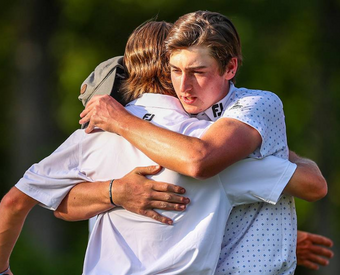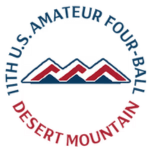Alternates Kittleson, Stoltz reach semis at U.S. Am Four-Ball
May 17, 2022 | by United States Golf Association
see also: Drew Kittleson, View results for U.S. Four-Ball, Desert Mountain Golf Club - Cochise Course

The two last-minute alternates from Scottsdale, Ariz. are two wins away from a USGA championship
“We qualified in Arizona, and it was like in September,” said Stoltz of being second alternates from their site. “It was so far [ago] that you just forget. You don’t put it on your calendar because you’re an alternate, and then Tuesday I was like oh, my God, that's this week. Here we go.”
They are joined in the semifinals by the other two co-medalist sides from stroke play, No. 2 seeds Carter Loflin, 18, of Duluth, Ga., and Wells Williams, 18, of West Point, Miss., and No. 3 Davis Womble, 28, of Winston-Salem, N.C., and fellow Wake Forest alum Chad Wilfong, 41, of Charlotte, N.C.

Wells Williams (facing) and his partner, Carter Loflin
Stoltz and Kittleson saw a 2-up lead after 12 holes evaporate when Edwards, a left-hander from Long Beach, Calif., who has advanced to final qualifying for this year’s U.S. Open, converted back-to-back winning birdie putts on the par-3 13th (2 feet) and par-4 14th holes (20 feet). The sides traded wins on Nos. 15 and 16 to set up a dramatic finish.
Kittleson ripped a 357-yard drive on the 447-yard closing hole, leaving him only 90 yards – “my favorite number” – to the flagstick. His 56-degree wedge approach bounced once and stopped 3 feet from the hole for a match-winning birdie.
Fourteen years ago, Kittleson, a former All-American at Florida State, was on the verge of a title before losing to future PGA Tour winner Danny Lee in the 36-hole final of the U.S. Amateur at Pinehurst No. 2.
“It was a long time ago,” said Kittleson, when asked if some of those vibes have returned this week. “I don't even know what I felt like then, but I know that winning a USGA championship would be awesome for anybody on the planet.”
This is new territory for Loflin, who is headed to the University of Georgia this fall, and Williams, a three-time American Junior Golf Association All-American who will play for Vanderbilt this fall. Neither has advanced this far in a USGA championship, but they have looked like seasoned veterans, starting with a first-round 61 on Saturday that set the 18-hole championship record.
The two future Southeastern Conference rivals were a combined 10 under par in 33 holes over their two matches on Tuesday, which included a 3-and-2 quarterfinal victory over 2018 runners-up Marc Dull and Chip Brooke. In the morning, they dispatched Towson University alums Jeffrey Castle and William Wingerd, 2 and 1, in their toughest match to date.
“Honestly I don't know how to explain this, but I would say we're not really nervous,” said Williams, a member of the 2021 USA Junior Ryder Cup Team. “We feel really settled. I'm not going to treat it any different than I've been treating all the other ones.”
Added Loflin: “We lost last year [in the Round of 32] just because we got super wound up in playing the other people. This year, we've [learned] … if you just stick to your game plan, then stuff will work out how you want it to.”
Wilfong and Womble had not played the last three holes of the West Course since Sunday’s final round of stroke play, when they carded an 8-under 63 to share medalist honors. After a comfortable 5-and-4 win in the Round of 16 on Tuesday morning over Blake Humbles and Connor Reis, two Southern Methodist University signees – Zach Kingsland, of Austin, Texas, and William Sides, of Tulsa, Okla. – took the duo to 18 in the quarterfinals before the No. 3 seeds prevailed, 1 up.
Wilfong and Womble built as much as a 3-up lead only to see Kingsland and Sides trim it to 1 hole with consecutive birdies on 15 and 16. A par by Womble on 17 preserved their lead, and on No. 18, Womble hit a sand-wedge approach from 110 yards to 12 feet and converted the birdie putt with Kingsland facing a 5-footer to possibly force extra holes.
“The energy bar on 17 was the key,” said Womble. “I was out of food. [My partner] gave me a bar.”
Added Wilfong, whose side played 7-under golf and didn’t make a bogey in two matches on Tuesday: “I don't think we did anything poorly. They made two really good birdies. So, you just kind of claw back … and it was good enough to just kind of squeeze them down.”
One of the longest matches in championship history occurred on Tuesday morning. Gingerich and Harris needed 24 holes to oust ex-University of Michigan teammates Matthew McLaughlin and Christian Vozza. Twice, the sides tied holes with birdies (Nos. 19 and 23) before Gingerich’s two-putt par on the 420-yard sixth hole ended the marathon.
The match was one hole shy of the longest in championship history, which was established last year at Chambers Bay when Blake Hathcoat and Michael Slesinski defeated Cole Berman and Mike Davis. In 2018 at Jupiter Hills, Wilfong and Womble lost in 24 holes to Steven Groover and M. Tyler McKeever.
What’s Next
One semifinal match on Wednesday will commence at 7 a.m. CDT (Loflin/Williams vs. Wilfong/Womble) with the second semifinal starting shortly after the suspended quarterfinal match concludes. The 18-hole championship match will follow at approximately 1 p.m.
by David Shefter, USGA
About the U.S. Four-Ball

The U.S. Amateur Four-Ball championship was played for the first time in 2015 at The Olympic Club in San Francisco, Calif. The event has no age restriction, however, it is only open to individual players with a Handicap Index of 2.4 or lower. It is o...
Most Popular Articles

FINAL RESULTS: 2026 Australian Men’s Amateur Championship
Feb 6, 2026Billy Dowling pulled away with a closing 7-under 63 to win the 2026 adidas Australian Men’s Amateur Championship at 18-under.
U.S. Open Qualifying 2026: Local & Final Qualifying Sites for Shinnecock
Feb 19, 2026The road to Shinnecock Hills begins in April as 110 local qualifying sites and 13 final qualifying venues are set.
Yunseo Yang Wins Women’s Amateur Asia-Pacific at Royal Wellington Golf Club
Feb 15, 2026Yunseo Yang makes history as Korea’s first WAAP champion, earning major exemptions with a dominant win.
FINAL RESULTS: Gasparilla Invitational 2026
Feb 21, 2026Hayes Brown wins Gasparilla at 2-under, edging Peyton White by one, while Jeff Frazier claims the Senior title at Palma Ceia.
2026 Genesis Invitational Collegiate Showcase Canceled Due to Heavy Rain at Riviera
Feb 16, 2026Heavy rain forced cancellation of the 2026 Genesis Invitational Collegiate Showcase at Riviera Country Club on Feb. 16.
